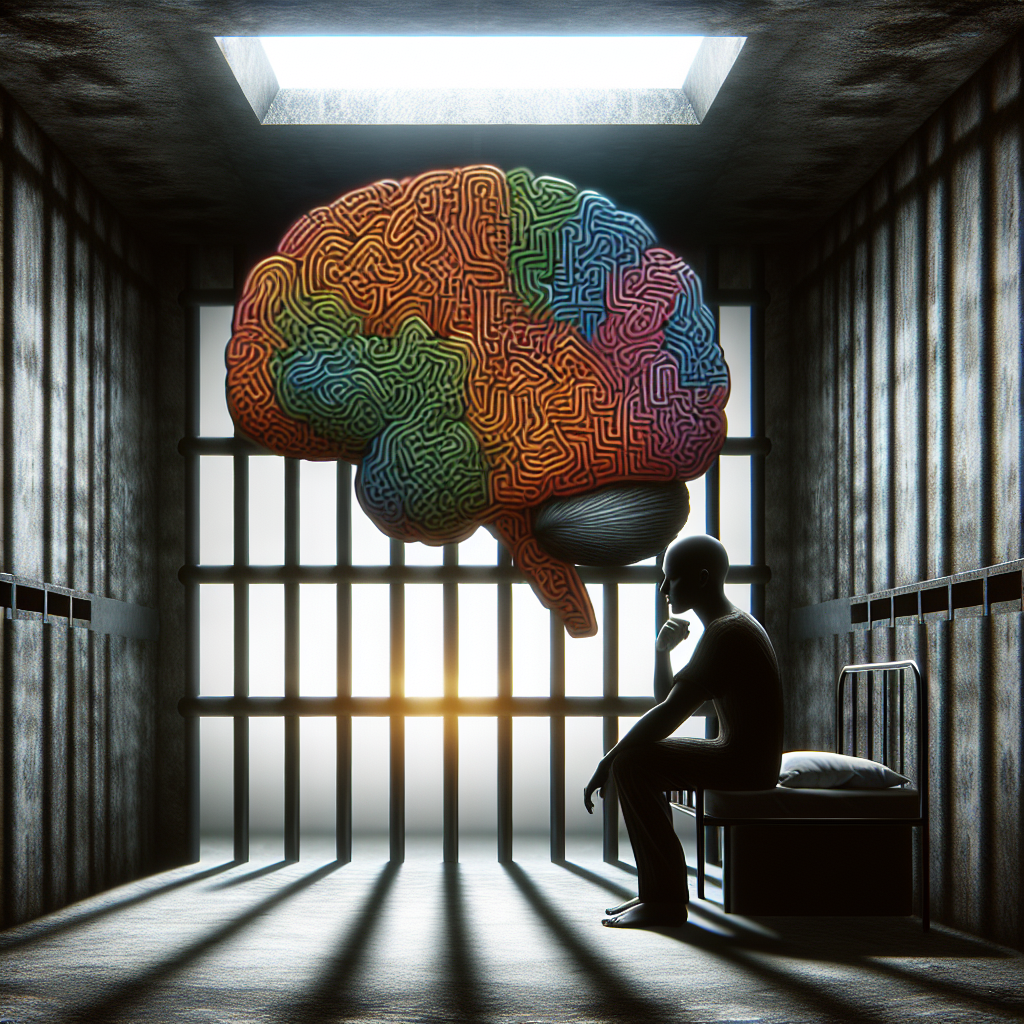
Introduction
In a world often quick to judge and condemn, the individuals behind bars—those who have made mistakes or found themselves caught in the web of societal issues—deserve a deeper understanding. Behind Bars: Understanding the Psychological Needs of Incarcerated Individuals is not just a phrase; it signifies a vital avenue for rehabilitation, mental health, and compassion. The psychological landscape of incarcerated individuals is complex and layered, with needs that often remain overlooked. This article embarks on a transformative journey to uncover these needs, aiming to shed light on the importance of mental health care within prison systems, and the profound impact it can have on both inmates and society at large.
Understanding the Psychological Landscape
The Stigma of Incarceration
Incarceration often carries with it a heavy stigma that can compound psychological issues faced by individuals behind bars. This stigma creates barriers to treatment and support, both while incarcerated and post-release. Addressing the psychological needs of these individuals is not merely an act of kindness—it is essential for managing the cycle of recidivism and the broader implications of crime in society.
Common Psychological Challenges
The psychological challenges faced by incarcerated individuals are manifold and can vary greatly depending on personal histories, types of offenses, and the prison environment. Common issues include:
- Depression: Many incarcerated individuals experience severe depressive symptoms, fueled by isolation, guilt, and hopelessness.
- Anxiety Disorders: The uncertainty of incarceration can heighten feelings of anxiety. This is compounded by the often dangerous environments faced in prisons.
- Post-Traumatic Stress Disorder (PTSD): Many individuals behind bars have histories marked by trauma, leading to PTSD symptoms that can be exacerbated in a prison setting.
- Substance Abuse Issues: Substance use disorders are prevalent among incarcerated individuals, often stemming from underlying psychological issues.
The Role of Mental Health Care
Recognizing and addressing these psychological needs is imperative. Mental health care within the prison system is not just an ethical obligation; it is a critical factor in rehabilitation. Supporting mental health effectively can lead to reduced recidivism rates, improved inmate behavior, and ultimately, safer communities.
Approaches to Understanding Psychological Needs
Case Study 1: The Role of Therapeutic Programs
Example: The New Jersey Department of Corrections initiated a Therapeutic Community program aimed at reducing substance abuse and improving mental health among inmates.
Analysis
This program emphasized group therapy, counseling, and life skills training. The results showed a decrease in drug-related incidents and a significant improvement in mental health assessments post-participation in the program. This demonstrates the power of targeted therapeutic interventions in fulfilling the psychological needs of incarcerated individuals.
Table 1: Results of the New Jersey Therapeutic Community Program
| Indicator | Before Program | After Program |
|---|---|---|
| Substance-Related Incidents | 40% | 20% |
| Mental Health Assessment Scores (Average) | 50 | 75 |
Building Empathy and Community
Creating a sense of community can significantly impact inmates’ psychological well-being. Programs that foster peer support, such as mentorship opportunities or group therapy, allow individuals to build social connections, reducing feelings of isolation.
Innovative Strategies for Addressing Needs
Case Study 2: Mindfulness and Meditation Programs
Example: A pilot program at a California correctional facility introduced mindfulness and meditation practices to inmates.
Analysis
Participants reported decreased levels of stress and anxiety. The mindfulness practice offered inmates tools to cope with their emotional turmoil and contributed to more harmonious living conditions within the prison. This highlights the potential for alternative therapies to meet psychological needs effectively.
Table 2: Impact of Mindfulness Programs in Correctional Settings
| Outcome | Pre-Program (Score 1-10) | Post-Program (Score 1-10) |
|---|---|---|
| Anxiety Levels | 8.5 | 4.0 |
| Peer Connections | 3.0 | 7.0 |
| Overall Well-being | 4.0 | 8.0 |
Facilitating Support Systems
Community Integration Programs
Reintegration into society can pose a significant challenge for inmates. Programs focusing on job training, education, and community service are essential for addressing their psychological needs. They not only help in skill-building but also mitigate the sense of fear and anxiety about life after incarceration.
Case Study 3: The Idaho Correctional Center’s Employment Program
Analysis
The Idaho Correctional Center created partnerships with local businesses to offer job training and placements for inmates nearing release. The program resulted in lower rates of recidivism and higher reported satisfaction from participants. Such initiatives illustrate that addressing psychological needs through vocational training is vital for successful rehabilitation.
Collaboration with Mental Health Professionals
Understanding Professional Support
It is crucial for prisons to collaborate with mental health professionals to create comprehensive mental health screenings and ongoing support. This creates a structured system where psychological needs can be continuously addressed.
Deploying Mental Health Screening Procedures
Early identification of mental health issues can guide tailored interventions. Implementing a standard procedure for mental health assessments upon entry into the prison system can ensure that psychological needs are documented and addressed promptly.
Challenges in Implementation
While there is a clear need for reform in addressing the psychological needs of incarcerated individuals, several challenges remain:
- Funding Shortages: Many prison systems face financial constraints that limit the availability of adequate mental health services.
- Stigmatization of Mental Health: Both staff and inmates may harbor biases that prevent open discussions about mental health.
- Staff Training: Ensuring that correctional staff are trained to recognize and deal with psychological issues is essential but often overlooked.
The Role of Policy Reform
Advocating for Change
To effect meaningful change, advocacy for policy reform is essential. Lawmakers should prioritize mental health resources within correctional facilities. Additionally, enhanced training programs for staff on psychological topics can create a culture of understanding and support.
Conclusion
Behind Bars: Understanding the Psychological Needs of Incarcerated Individuals beckons society to shift its lens from judgment to empathy. By recognizing the psychological complexities of those in prison, we can foster rehabilitation rather than mere punishment. Accessible mental health care, innovative programming, and community support systems are not just beneficial; they are imperative for breaking the cycle of recidivism and rebuilding lives. Encouragingly, as we become more aware and involved, we not only uplift those behind bars but also fortify the very fabric of our communities.
FAQs Section
1. What are the most common psychological disorders found among incarcerated individuals?
Commonly, incarcerated individuals struggle with depression, anxiety disorders, PTSD, and substance use disorders.
2. How does stigma affect the psychological care of inmates?
Stigma can lead to reluctance in seeking help for mental health issues, creating barriers for treatment both inside and outside prison.
3. What role do rehabilitation programs play in addressing psychological needs?
Rehabilitation programs focus on skill-building, therapy, and community integration, which directly address and improve the psychological well-being of incarcerated individuals.
4. Are mindfulness and meditation effective for inmates?
Yes, studies show significant improvements in stress and anxiety levels among inmates who participate in mindfulness and meditation programs.
5. How can family involvement aid in the psychological recovery of incarcerated individuals?
Family involvement can provide a support network that fosters emotional resilience, reducing feelings of isolation and enhancing mental health outcomes.
This exploration of Behind Bars: Understanding the Psychological Needs of Incarcerated Individuals seeks to illuminate a path toward compassion and understanding. By recognizing their needs and addressing them holistically, we not only serve incarcerated individuals but also enrich our society, contributing to a more humane approach to justice.












